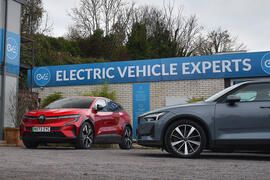
Electric cars must comprise 22% of any given car maker's sales this year“Unsustainable” discounting due to ZEV mandate means electric cars buck market trends
UK registrations of electric cars continued to grow last month despite a slump in the overall number of new cars hitting the road.
According to new figures released by trade body the Society of Motor Manufacturers and Traders, 153,610 new cars were registered in the UK during November. This is 1.9% lower than the same month a year ago.
However, electric car registrations increased by 58.4% to 38,581 units.
This meant EVs represented just over one in every four cars registered last month (25.1%), a significant improvement on their November 2023 market share of 15.1%.
For reference, petrol-powered cars accounted for 45.8% of new car sales in November. That’s down by 8.8% compared with a year ago, due to a 17.7% dip in registrations to 70,317 cars.
Plug-in hybrids took 10.2% of the market (a nominal 0.1% increase) while hybrids accounted for a further 12.8% (down 0.2%).
Diesel cars’ market share fell by 0.6%, to just 6.1% of the overall tally.
The SMMT attributed the stark rise in electric car registrations to heavy discounts introduced by manufacturers, totalling an "unsustainble" £4 billion over the course of the year.
These have been introduced as a result of the zero-emission vehicle mandate (ZEV mandate), which requires that 22% of any given manufacturer’s new car sales in 2024 be electric.
Manufacturers face fines of £15,000 for every single combustion-engined car that they sell in breach of that ratio.
It is likely that some car companies are also pre-registering electric cars (that is, registering them before they have been sold) in order to bolster their ‘sales’ numbers in a bid to comply with the mandate.
Indeed, electric cars account for 18.7% of the 1,811,992 new cars registered so far this year, which is some way short of the 22% target.
SMMT chief executive Mike Hawes said: “Manufacturers are investing at unprecedented levels to bring new zero-emission models to market and spending billions on compelling offers.
“Such incentives are unsustainable. Industry cannot deliver the UK’s world-leading ambitions alone.
“It is right, therefore, that government urgently reviews the market regulation and the support necessary to drive it, given EV registrations need to rise by over a half next year.
“Ambitious regulation, a bold plan for incentives and accelerated infrastructure roll-out are essential for success, else UK jobs, investment and decarbonisation will be at further risk.”
The UK’s best-selling car last month was the Mini Cooper, with 4412 registrations.
This was followed by the Nissan Qashqai (3776 registrations) and the Tesla Model Y (3350).
As for the full year’s best-seller, it looks like being a race between the Ford Puma, with 45,538 registrations between January and the end of November, and the Kia Sportage, with 45,454. They’re followed by the Qashqai (39,047).